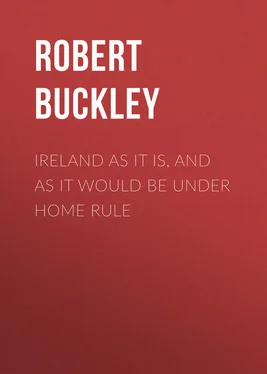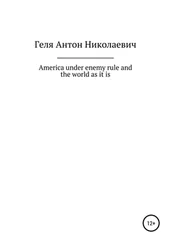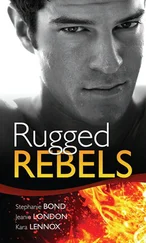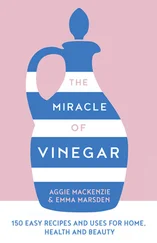Robert Buckley - Ireland as It Is, and as It Would Be Under Home Rule
Здесь есть возможность читать онлайн «Robert Buckley - Ireland as It Is, and as It Would Be Under Home Rule» — ознакомительный отрывок электронной книги совершенно бесплатно, а после прочтения отрывка купить полную версию. В некоторых случаях можно слушать аудио, скачать через торрент в формате fb2 и присутствует краткое содержание. ISBN: , Жанр: foreign_antique, foreign_prose, на английском языке. Описание произведения, (предисловие) а так же отзывы посетителей доступны на портале библиотеки ЛибКат.
- Название:Ireland as It Is, and as It Would Be Under Home Rule
- Автор:
- Жанр:
- Год:неизвестен
- ISBN:http://www.gutenberg.org/ebooks/29710
- Рейтинг книги:5 / 5. Голосов: 1
-
Избранное:Добавить в избранное
- Отзывы:
-
Ваша оценка:
- 100
- 1
- 2
- 3
- 4
- 5
Ireland as It Is, and as It Would Be Under Home Rule: краткое содержание, описание и аннотация
Предлагаем к чтению аннотацию, описание, краткое содержание или предисловие (зависит от того, что написал сам автор книги «Ireland as It Is, and as It Would Be Under Home Rule»). Если вы не нашли необходимую информацию о книге — напишите в комментариях, мы постараемся отыскать её.
Ireland as It Is, and as It Would Be Under Home Rule — читать онлайн ознакомительный отрывок
Ниже представлен текст книги, разбитый по страницам. Система сохранения места последней прочитанной страницы, позволяет с удобством читать онлайн бесплатно книгу «Ireland as It Is, and as It Would Be Under Home Rule», без необходимости каждый раз заново искать на чём Вы остановились. Поставьте закладку, и сможете в любой момент перейти на страницу, на которой закончили чтение.
Интервал:
Закладка:
The late Lord Leitrim was exalted to the skies, but his murdered father was visited with blackest malediction. At Clones, in the County Monaghan, I met a sort of roadside specimen of the Agricola Hibernicus , who explained his position thus: – "Ye see, we wor rayduced 35 per cent., an' 'tis thrue what ye say; but then produce is rayduced 50 per cent., so we're 15 per cent. worse off than iver we wor before. We want another Land Act that'll go to the root. An' that we'll get from an Oirish Parliament an' only from that. 'Tis not the tinints that's always the worst off. Many's the time I seen thim that had a farrum of their own go to the dogs, while thim that had rint to pay sthruggled and sthrived an' made money an' bought the freeholders out. For whin they had nothin' to pay they did no work, an' then, bedad ivery mortial thing wint to the divil. An' that's how it'll be wid the lazy ones once we get Home Rule, which means the land for nothin' or next to nothin'. Barney will kick up his heels and roar whirroo, but call again in a year an' ye'll see he hasn't enough money to jingle on a tombstone."
My next from the New Tipperary, whither I journey viâ Kildare, Kilkenny, and Limerick, en route for Cork and the Blood-taxed Kerry, where Kerry cows are cut and carved. Now meditation on marauding moonlighters makes melancholy musing mine.
Limerick, April 11th.
No. 8. – TERRORISM AT TIPPERARY
Tipperary is Irish, and no mistake. Walking into town from Limerick the first dwellings you reach are of the most primitive description, whether regarded as to sanitary arrangements or otherwise. The ground to the right slopes downwards, and the cabins are built with sloping floors. The architects of these aboriginal erections stuck up four brick walls, a hole in, a hole out, and a hole in the top, without troubling to level the ground. Entering, you take a downward step, and if you walk to the opposite exit, you will need to hold on to the furniture, if any. If you slip on the front step you will fall head first into the back yard, and though your landing might be soft enough, it would have a nameless horror, far more killing than a stony fall. The women stand about frowsy and unkempt, with wild Irish eyes, all wearing the shawl as a hood, many in picturesque tatters, like the cast-off rags of a scarecrow, rags and flesh alike unwashed and of evil odour. The children look healthy and strong, though some of them are almost in puris naturalibus . Their faces are washed once a week; one of them said so, but the statement lacks confirmation, and is opposed to the evidence of the senses. Scenes like these greet the visitor to Old Tipperary, that is, Tipperary proper, if he enter from Limerick. The town is said to be old, and in good sooth the dunghills seem to possess a considerable antiquity. In this matter the Tipperary men are sentimental enough – conservative enough for anything. At Tipperary, of all places, the brutal Saxon will learn how much has been bequeathed to Irishmen by their mighty forefathers.
The eastern side is better. A grand new Roman Catholic church has just been built at a cost of £25,000, and in front of the gilded railings – for they are gilt like the railings of Paris – were dreadful old women, like Macbethian witches, holding out their skinny hands for alms. Smartly dressed young ladies, daughters of publicans and shopkeepers, passed in jauntily, took a splash in the holy water, crossed themselves all over, knocked off a few prayers, and tripped merrily away. The better parts of the town belong to Mr. Smith-Barry, the knock-me-down cabins to Mr. Stafford O'Brien, whose system is different. As the leases fall in the former has modern houses built, while the latter is in the hands of the middlemen, who sub-let the houses, and leave things to slide. The laissez-aller policy is very suitable to the genius of the genuine Irish, who may be said to rule the roost in Tipperary.
I interviewed all sorts and conditions of men, but every individual bound me down to closest secrecy. And although nobody said anything approaching high treason, their alarm on finding they had ventured to express to a stranger anything like their real opinion was very significant. The conversations took place last evening, and this morning before breakfast a young man called on me at the Station Hotel, Limerick Junction, three miles from Tipperary, "on urgent business." "Me father thinks he said too much, an' that ye moight put what he said in print, wid his name to it. Ye promised ye wouldn't, an' me father has confidence, but he wishes to remoind ye that there's plinty in Tipperary would curse him for spakin' wid an Englishman, an' that dozens of thim would murther him or you for the price of a pot of porter." Another messenger shortly arrived, bearing a letter in which the writer said that any mention of his name would simply ruin him, and that he might leave the country at once. And yet these men had only said what Englishmen would account as nothing.
New Tipperary adjoins the old, to which it is on the whole superior. All the descriptions I have seen of the Land League buildings are untrue and unfair. Most of them were written by men who never saw the place, and who paraphrased and perpetuated the original error. It was described as a "mile or two from Tipperary," and the buildings were called "tumble-down shanties of wood, warped and decaying, already falling to pieces." The place adjoins and interlocks with the old town; it is not separated by more than the breadth of a street, is largely built of stone, and comprises a stone arcade, which alone cost many thousands. Some of the cottages are of wood, but they look well, are slated, and seem in good condition. The butter mart, a post and rail affair, with barbed wire decorations, is desolate enough, and nearly all the shops are shuttered. Enamel plates with Dillon Street and Emmett Street still attest the glory that has departed, but the plate bearing Parnell Street escaped my research. The William O'Brien Arcade is scattered to the winds, save and except the sturdy stone walls, which ( à la Macaulay's New-Zealander) I surveyed with satisfaction, sketching the ruins of the structure from a broken bench in Dillon Street.
A full and true history of the New Tipperary venture has never been written. As in the present juncture the story is suggestive and instructive, I will try to submit the whole in a form at once concise and accurate. The particulars have been culled with great pains from many quarters and carefully collated on the spot, and may be relied on as minutely exact and undeniable. Everyone admits Mr. Smith-Barry's claim to the title of a good landlord, an excellent landlord, one of a thousand. Before the casus belli was found by William O'Brien all was prosperity, harmony, and peace. Mr. Smith-Barry owns about 5,000 acres of land situate in the fat and fertile plain of Tipperary, known as the Golden Vale, with the best part of the county town itself. Tipperary is a great butter centre. The people are ever driving to the butter factory, which seemed to be worked in the Brittany way. Donkey-carts driven by women, and bearing barrels of milk, abound on the Limerick Road. The land is so rich, grand meadows, and heavy dairy-ground, that the place prospered abundantly, and was by commercial men reckoned an excellent place for business. But they have changed all that. The Tipperary folks were once thought as good as the Bank of England. Now they dislike to pay anything or anybody. Their delicate sense of meum and tuum is blunted. They take all they can get, and pay as little as they can. They affect dunghills and dirt, and have a natural affinity for battle, murder, and sudden death. How did all this come about?
First, as to Mr. Smith-Barry's character. The most advanced Nationalists, the Fenian papers, the Catholic clergy, all concurred in blessing him. The Roman Catholic Bishop of Cloyne, Canon Hegarty, P.P., and Tim Healy spoke of him in the character of a landlord in highest terms. Sir Charles Russell, Tim Harrington, Mr. O'Leary (Chairman of the Clonakilty Town Commissioners, a violent Nationalist), and Canon Keller (R.C.) unanimously agreed that Mr. Smith-Barry must be exempted from the general condemnation of Irish landlords. They said he was the "kindest of landlords," and that his tenants were "comfortable, respectable, and happy." They proclaimed his "generous and noble deeds," declaring that "there have been no cases of oppression or hardship, and the best and most kindly relations have existed." All these sayings are gathered from Nationalist papers, which would supply thousands of similar character, and up to the time of O'Brien's interference, none of an opposite sort. But, as Serjeant Buzfuz would have said, the serpent was on the trail, the viper was on the hearthstone, the sapper and miner was at work. Thanks to the patriot's influence, the Paradise was soon to become an Inferno.
Читать дальшеИнтервал:
Закладка:
Похожие книги на «Ireland as It Is, and as It Would Be Under Home Rule»
Представляем Вашему вниманию похожие книги на «Ireland as It Is, and as It Would Be Under Home Rule» списком для выбора. Мы отобрали схожую по названию и смыслу литературу в надежде предоставить читателям больше вариантов отыскать новые, интересные, ещё непрочитанные произведения.
Обсуждение, отзывы о книге «Ireland as It Is, and as It Would Be Under Home Rule» и просто собственные мнения читателей. Оставьте ваши комментарии, напишите, что Вы думаете о произведении, его смысле или главных героях. Укажите что конкретно понравилось, а что нет, и почему Вы так считаете.












